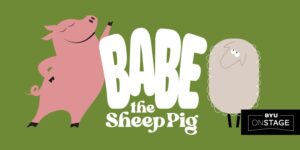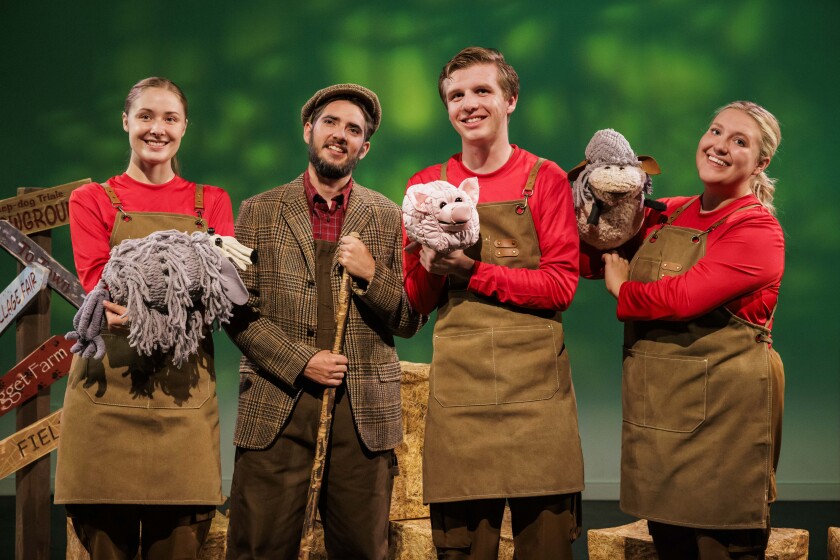PROVO — Like many millennials, the movie Babe is a nostalgic favorite. The 1995 motion picture, adapted from the novel The Sheep Pig by Dick King-Smith, was a surprise cultural sensation ending up with 6 Academy Award nominations (including Best Picture) and one win (for Visual Effects). It even inspired a significant number of people (including actor James Cromwell as Farmer Hoggett) to become vegetarians. In my house, though, Babe was primarily the funny story about the plucky pig with the nice dog and the mean dog, the repetitious sheep, and the high-pitched singing mice who ushered in scene changes. It was a film all the kids enjoyed and none of the adults complained about watching, making it the best kind of family film. Keeping with that spirit, David Wood’s stage adaptation of the tale as put on by BYU Young Company and directed by Teresa Love is certainly directed primarily for a younger audience, but there’s plenty for the adults to love as well.
The story of Babe the Sheep Pig follows Babe to Farmer Hoggett’s farm, where the motherless piglet is “adopted” by Fly, Hoggett’s dog. Since Fly is a working dog that herds sheep, Babe follows along. While Fly leans into a more demanding approach to putting the sheep through their paces, Babe prefers to be more polite and asks nicely for the sheep to cooperate. He wins the sheep over, and soon Babe is put to work as the new “sheep pig.” He is eventually entered into sheepdog trials where he gets the chance to show off his herding prowess to the public.
From the moment you enter the theatre, it’s clear that Director Teresa Love has worked to help the attending children feel as though they are welcomed in the space. There’s special seating for the kids who want to be closer to the action, and the cast mingles around and gets to know everyone. It’s a smart move that helps build a camaraderie between the younger audience members and the actors, especially given the amount of audience participation involved in this production. Some of my earliest professional theatre gigs as a performer were in children’s plays where the cast would need to identify a few eager audience members who might be able to participate for a few moments in a scene. It’s something that can’t truly be rehearsed for and requires actors to be quick on their feet, and comfortable with adjusting to what may happen when actual children are finally involved. Especially when this show has near-constant involvement for willing audience members, I was particularly impressed with the way the cast worked to spread the love so that each willing child had a chance to contribute. If anyone had been left out, everyone who wishes can take part in one delightful scene toward the end. It was wonderful to see such deliberate inclusion in meaningful ways inviting children to put their imagination to use, manipulate puppets, and help tell the story.

The cast works well together, taking on a wide range of parts throughout. As Babe, Jacob Day is charming and approachable, with a wide-eyed innocence and eagerness that made it easy to root for his success. Truman Barnes as Farmer Hoggett was also delightful. While Barnes is typically set apart from the rest of the cast (usually working on something around the farm), he plays a critical role in some of the more emotionally heightened moments in the show. Barnes does so in an understated way but also rather grounded — particularly in the scenes immediately after the tragic killing of one of the sheep on the farm. I was also very endeared to Emmie Webb throughout. Webb was particularly skillful at bringing something different to each character she played, giving each a dynamic personality and unique voice. Webb also seemed the most natural and comfortable working with the kids on stage.
While the set and puppet design is largely successful, I have mixed feelings about the puppet design by Kim Wright and Dallin Blankenship. The set is made up almost entirely of puppets disguised as various settings, and the multi-functionality of the design is impressive. Looking around toward the end of the production, it’s easy to realize that nearly everything on stage doubles as a puppet, which is rather magical to see. The design of each puppet is whimsical, and definitely intended for the close-up, often hands-on experience that audiences attending this show will have. I would have liked to have seen more of the puppets with increased capacity for articulation. Articulation in a puppet gives more opportunities for dynamic performances for example with movable legs, mouths, arms, etc. While the primary puppet characters (Fly, Babe, Ma, and Mrs. Hoggett) were all able to articulate fairly well, the majority of the other puppets could not. This didn’t deter much for characters with smaller parts to play, but those with longer speeches or who appeared on stage more (like the puppies or the sheep) lost some emotional resonance. A bit more dynamic designs with more distinct and varied movement for each animal by the actors may have given a bit more oomph to some scenes.
I would also love to have seen some gestures added to the “password” that Babe is taught to help him befriend the new sheep at the trials toward the end of the show. Unlike the film’s simple and memorable “Baa Ram Ewe,” this password is much longer. Having the entire audience “help” Babe remember it is a great way to get everyone (including the adults) in on the action, but it may have been a bit easier to remember and a bit more fun to repeat with some visual aids for each section of the rhyme. Visual gestures as an aid may also have helped the younger kids understand what they were saying.
Small gripes aside, I couldn’t help watching this production and wishing I’d seen it as a kid. So often we take children to the theatre and half brace ourselves for the battle of keeping them still and quiet, even in shows that are largely for them. It’s refreshing to step into a production that welcomes its young audience members with open arms, encourages them to touch and feel, and makes them central to the final moments of Babe’s triumph. It’s hard to imagine a kid not having a great time at this production.
[box] The BYU Arts production of Babe, the Sheep Pig plays Wednesday through Friday at 7:00 PM and Saturday at 2 PM and 4PM through November 23rd at the Studio Theatre in the West Campus Building on the campus of Brigham Young University. Tickets are $9-12. For more information, visit arts.byu.edu [/box]
